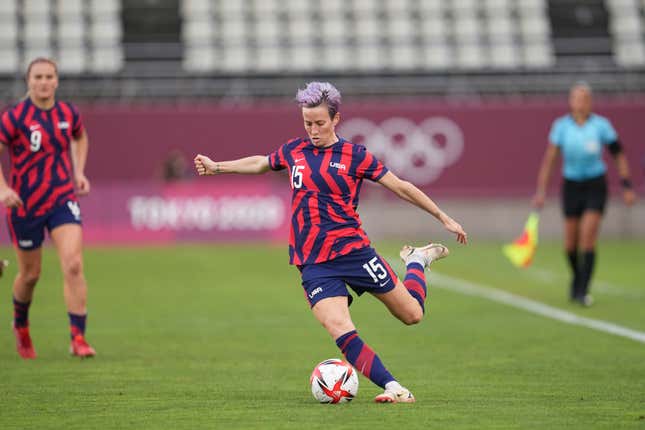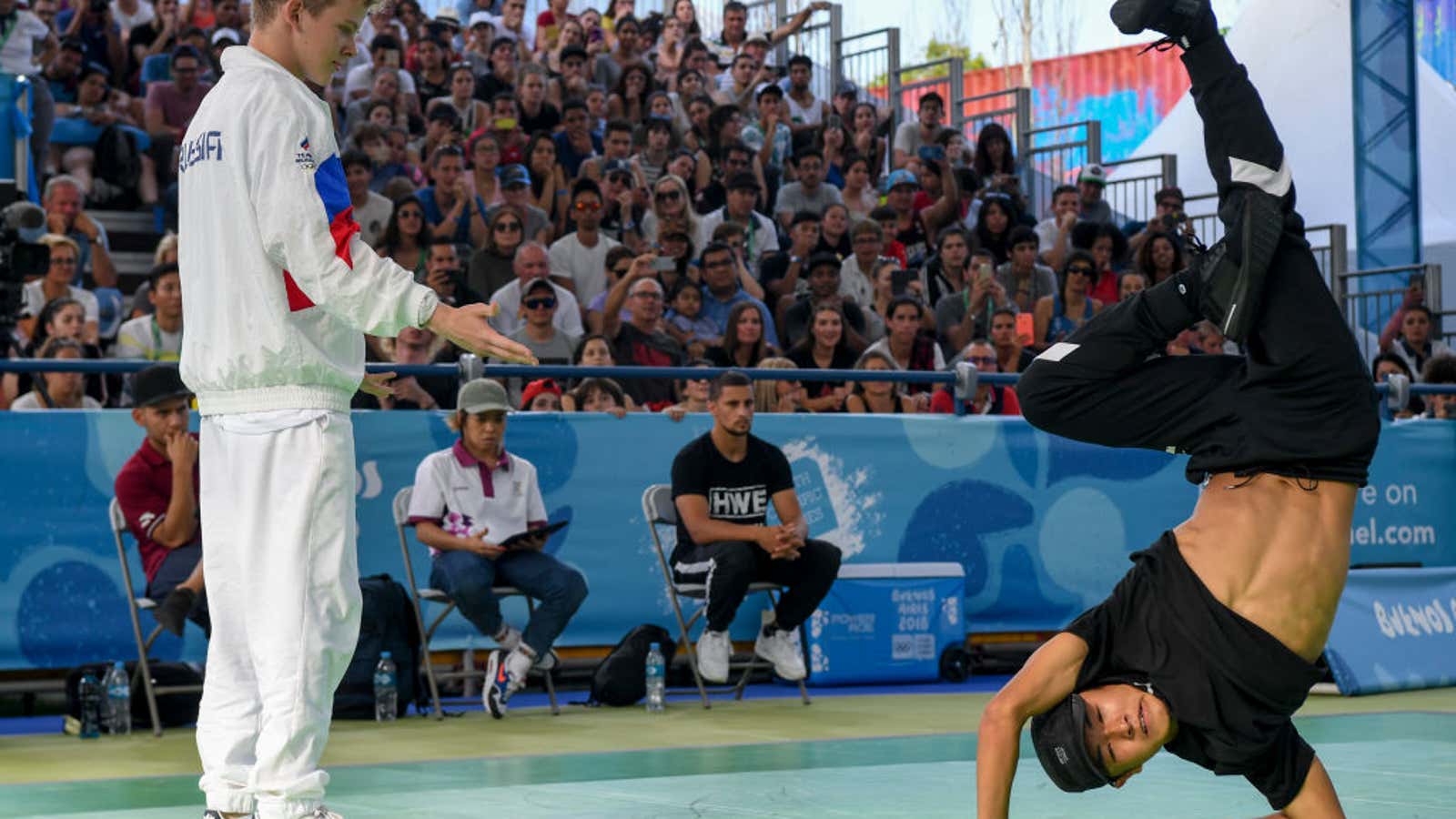Hi Quartz readers!
Have you been enjoying this email? Let us know by taking a quick survey. We promise not to be (too) upset if we don’t get a perfect score.
Highlight reel
- Quan Hongchan, a 14-year-old from China, scored two perfect 10s and was rewarded with a gold medal in women’s 10m platform diving.
- The US women’s soccer team prevailed against Australia in the bronze medal match.
- Jamaica’s Hansle Parchment won gold in the 110m men’s hurdles ahead of world champion Grant Holloway (US).
- India’s men’s field hockey team claimed bronze, its first Olympic medal in the sport in 41 years. (Belgium beat Australia for the gold medal.)
- Burkina Faso got its first-ever Olympic medal, a bronze for Hugues Fabrice Zango in the men’s triple jump.
Artistic license
Breakdancing will debut as an Olympic sport at the Paris Games in 2024, joining the small but growing number of events—including ice dancing, rhythmic gymnastics, artistic swimming, and (briefly) ski dancing—that tread the line between art and sports. But where exactly is the line?
Simply put, sports have rules that must be followed to score points. You can’t just put a ladder next to the basket and run up it to put the ball in the hoop, explains Angela J. Schneider, a silver medal-winning Olympic rower and University of Western Ontario sports ethics professor. In contrast, unless the viewer is a true aficionado, a good ballet performance often comes down to individual feelings.
Some sports, such as gymnastics and figure skating, have both an artistic element and a technical one. But Olympics organizers use a point system meant to make those events more objective, resulting in stricter rules on the artistic components, says Schneider. For example, to make scoring less subjective, the International Gymnastics Federation (FIG) eliminated the perfect “10” in 2005 after a controversy over a tenth of a point at the Athens Games.
Some critics say that the inclusion of breakdancing in the Olympics would prioritize technical skills over qualities like passion and originality. How exactly do you measure passion? And in turn, for the average viewer, the Olympics adaptation of a performance you enjoy watching could change how it makes you feel. Perhaps it’s not so much about whether something can be scored and more so what gets lost when it is. —Michelle Cheng
By the digits
56,000: Konbini (convenience stores) found throughout Japan. They have been a haven for many international travelers, who can’t go to local restaurants due to Covid restrictions.
28: Olympic medals Michael Phelps won over the course of his career, the most of any athlete
2.3 million metric tons: Estimated CO2 output of the Olympic Games, lessened by the lack of spectators, that needs to be offset
14: Number of participants who completed the first Olympic marathon in 1904 (44% of the total entrants), the lowest of all time
1995: Year the dancing inflatable man was invented for the Atlanta Olympics’ opening ceremony the following year
29.3°C (84.7°F): Water temperature of Tokyo Bay at the start of the women’s 10km open water swim at 6:30am on Wednesday
What to watch for
The modern pentathlon runs Thursday through Saturday and, if you’re a fair weather fan of the Olympics, you probably have to remind yourself what the modern pentathlon is every four years. As the name suggests, there are five events involved: épée fencing, freestyle swimming, equestrian show jumping, pistol shooting, and cross-country running.
The sport is an ode to the original pentathlon of the ancient Olympics: a set of skills that any Greek soldier would need. Today, the sport is one of the most financially prohibitive, particularly due to the amount of equipment involved. Instead of gearing up for one sport, you’re outfitting yourself for five—and everything is expensive when there’s a horse involved.
Quotable
“Just run fast and get it over and done with as soon as I can so I can go and eat cake.” —Canadian men’s decathlon athlete Damian Warner, who won gold in Tokyo, describing his motivation when competing. Reportedly, and relatably, he’s also motivated by ice cream.
Equal pay for equal play

The US women’s soccer team’s bronze medal is sure to add fuel to the fire in its ongoing fight for equal pay.
Despite being the top-ranked team in the world for the last six years, its players earn 89 cents on the dollar per game compared to the US men’s team (ranking between 20th and 32nd worldwide), and far less in bonuses for making it to the World Cup. Players filed a gender discrimination lawsuit in 2019. But a federal judge tossed out their equal pay claims last year, saying that the women were not underpaid compared to men if calculated by total compensation.
A few weeks ago, the women’s soccer team appealed the decision, noting that they had to win many more games than the men’s team for total compensation to even out. “The Equal Pay Act forbids making a woman work more, or perform better, to achieve the same pay as a man doing the same job,” the appeal notes.
Instant replay
🦿 An amputee’s company will help Paralympians run and jump in Tokyo
👟 Nigeria’s awful Tokyo Olympics made Puma cancel a $2.7 million deal
🤼♂️ Meet Ravi Dahiya, the dark horse of India’s wrestling contingent
🎵 This email was produced while listening to John Williams’s “Olympic Fanfare and Theme.” No we are not tired of it, but thank you for asking.
Our best wishes for an inspiring day. Get in touch with us at needtoknow@qz.com and live your best Quartz life by downloading our iOS app and becoming a member. Today’s email was brought to you by Michelle Cheng, Scott Nover, Sarah Todd, Jordan Weinstock, and Liz Webber.
